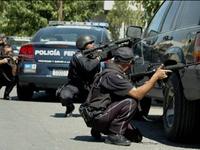-
Texas county police buys drone that can carry weapons

The police in Montgomery County — and area north of Houston, Texas — is the first local police in the United States to deploy a drone that can carry weapons; the police says it will be used in chases of escaping criminals and tracking drug shipments
-
-
Eight NY police officers charged for gun-smuggling

Eight police officers in New York City were charged on Tuesday for taking part in a gun-smuggling ring; the men stand accused of using their experience and authority to help illegally transport guns, slot machines, cigarettes, and counterfeit goods across state lines; among the items the men are accused of smuggling are twenty firearms including three M-16 assault rifles, a shotgun, and sixteen handguns
-
-
Riot police clear Oakland of Occupy Wall Street protestors
Early Tuesday morning, police officers clad in riot-gear arrested seventy-five people in Oakland, California as they cleared city hall of Occupy Wall Street protestors; the protestors had been camped out in front of Oakland’s city hall for about two weeks, before hundreds of police officers and sheriff’s deputies from more than a dozen local law enforcement agencies descended upon them firing tear gas and beanbag launchers
-
-
FBI training elite deep-diving counterterrorism unit
To bolster its counterterrorism capabilities, the FBI has created an elite group of special agents trained to track terrorism underwater
-
-
Detecting criminals coming back to the scene of the crime
Law enforcement officials believe that perpetrators of certain crimes, most notably arson, do come back to the scene of the crime to witness their handiwork; similarly, U.S. military in the Middle East feel that improvised explosive device (IED) bomb makers return to see the results of their work in order to evolve their designs; scientists have developed a method to identify these individuals
-
-
DHS developing "pre-crime" surveillance tech

Researchers at DHS are working to develop technology that could catch individuals before they commit a crime
-
-
U.S.: Iranian agents tried to kill Saudi ambassador to U.S.

The U.S. attorney general Eric Holde rannounced yesterday that the U.S. government has foiled an Iranian plot to assassinate the Saudi ambassador to the United States; Iran wired $100,000 into a U.S. bank account in August as a down payment for the hit; the assassins — the Iranians thought they were members of a Mexican drug cartel — were to receive $1.5 million if the hit was successful
-
-
German police uses backdoor Trojan to monitor Skype calls
A backdoor Trojan capable of monitoring online activity and recording Skype calls has been detected — and is allegedly being used by the German police force
-
-
TraceSpan Communications shows new interception device
DOCSIS Phantom intercepts target communications directly from the line and collects a hundred percent of the information in both directions, to and from the ISP or communications provider; the device allows interception of all data, including peer-to-peer communication, even when it does not pass through the ISP server
-
-
Calif. Allows warrantless searches of cell phones

California Governor Jerry Brown has vetoed a bill which aimed to prohibit California police from conducting warrantless searches of the cell phones of people under arrest
-
-
Former colleagues: accused anthrax killer could not have done it
Two former colleagues of Bruce Ivins, a scientist who worked at the U.S. Army Medical Research Institute of Infectious Disease (USAMRIID) in Frederick, Maryland, and who was accused by the FBI of being behind the 2001 anthrax attacks in the United States, said he could not have done it (Ivins committed suicide in July 2008)
-
-
Mexico now dominated by two powerful cartels

Five years and more than 35,000 deaths into Mexico’s bloody drug war, two cartels have emerged as the dominant force in narcotics and the two are poised to slug it out in a dangerous battle for control; the Mexican governmen’s crackdown on the drug cartels has left many gangs splintered and operationally less effective without their leaders; in the ensuing power vacuum, the Zetas and Joaquin “El Chapo” Guzman’s Sinaloa cartel have stepped up as the two leading gangs
-
-
Alabama explores shirt-cameras for police
With the increasing availability of cheap wearable cameras, more and more police officers could be recording their every move
-
-
Colorado slashes auto-theft rate with fusion center
In 2005 Colorado had one of the highest rates of vehicle theft in the country, but thanks to the dogged efforts of local law enforcement officials and the Auto Theft Intelligence Coordination Center the state is now below the national average
-
-
Free database helps crack cold case from 1984
A cold case investigation into the whereabouts of a man who went missing in 1984 was recently solved with the help of a free online law enforcement database
-
- All
- Regional
- Water
- Biometrics
- Borders/Immig
- Business
- Cybersecurity
- Detection
- Disasters
- Government
- Infrastructure
- International
- Public health
- Public Safety
- Communication interoperabillity
- Emergency services
- Emergency medical services
- Fire
- First response
- IEDs
- Law Enforcement
- Law Enforcement Technology
- Military technology
- Nonlethal weapons
- Nuclear weapons
- Personal protection equipment
- Police
- Notification /alert systems
- Situational awareness
- Weapons systems
- Sci-Tech
- Sector Reports
- Surveillance
- Transportation
Advertising & Marketing: advertise@newswirepubs.com
Editorial: editor@newswirepubs.com
General: info@newswirepubs.com
2010-2011 © News Wire Publications, LLC News Wire Publications, LLC
220 Old Country Road | Suite 200 | Mineola | New York | 11501
Permissions and Policies
Editorial: editor@newswirepubs.com
General: info@newswirepubs.com
2010-2011 © News Wire Publications, LLC News Wire Publications, LLC
220 Old Country Road | Suite 200 | Mineola | New York | 11501
Permissions and Policies
